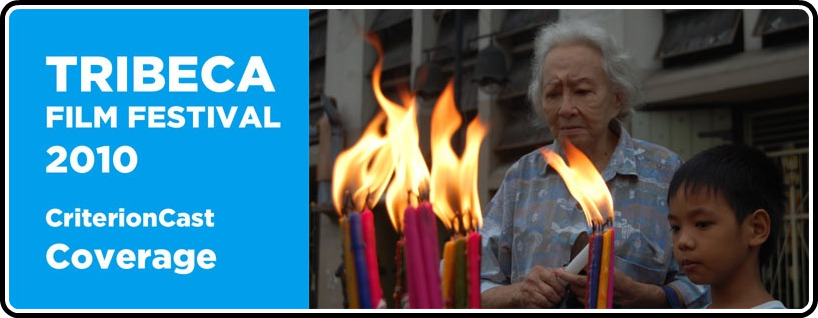One of the gems I screened at the Tribeca Film Festival this year was Brilliante Mendoza’s “Lola”. This is the latest film from the Filipino filmmaker who, for me, came out of nowhere. His breakout film, from 2008 was “Kinatay” (Butchered) was in competition in the 62nd Cannes Film Festival. Mendoza won Prix de la Mise en Scene (Best Director) for Kinatay during the festival. Moreover “Kinatay” was the first Filipino film accepted for competition for Cannes since 1984. Going into this film, I had huge expectations for the success of it. And my word, it does deliver.
“Lola” (Grandmother) is the story of a random act of violence and how it’s affected by the grandmother’s of those involved. The film starts with Lola Sepa who is traveling through the mean streets of Manlia with her grandson. They are on their way to make an appointment. When the picture starts, you’re not quite sure what these two are up to. It’s not until they meet up with Lola Sepa’s daughter at a funeral home. They are shopping for coffins. This opening scene is done in a very interesting way. The point of the scene is the purchasing of coffins but before then are smaller scenes of prayers at a church, a memorial, and a mugging on the streets. When we get to the funeral home we think Lola Sepa is buying a coffin for herself but then we find out she’s buying a coffin for her grandson, who was murdered days before.
Lola Carpin is the grandmother of the suspected killer, Mateo. We first meet Lola Carpin visiting her grandson in prison. We are brought to this rather scary and rough Filipino prison filled with equally scary and rough prisoners. On first meeting with her grandson, Lola Carpin is more concerned with general well being of Mateo. She asks him whether or not he has eaten dinner today. This is an organic response of a grandmother visiting her grandson. In this way, her view of Mateo is genuine. Her feelings towards his alleged crime is non-existent rather she ignores the suspicions and the backdrop of the scene.
Mendoza plays this film in an interesting way, dealing with grief and loss through the strength of two elderly matriarchs. One deals with it buy accepting and moving on, the other ignores and manufactures her perfect family. Both are caretakers of their respective families so who are we to judge whether one way is better than the other. Mendoza puts these ideas in the context of the grief. His camera is objective, shot as a documentary, Mendoza follows the action rather than creates it.
“Lola” is a highly engaging and absolutely riveting piece of true cinema. It plays as an interesting character study of two women dealing with the changing face of their families. Rather than explore whether Mateo is guilty or innocent, Mendoza choses to show the affect of violence on its victims. He also subverts the tropes of the procedural courtroom genre. Placing the fates of the families in the Filipino justice system but never shows the outcome or the stakes. They seem unimportant to the film as if they are unimportant to seeking justice. Brillante Mendoza has created a masterpiece. A gem of a film from a relatively unknown filmmaker from a country not known for its films. Highly recommended!



